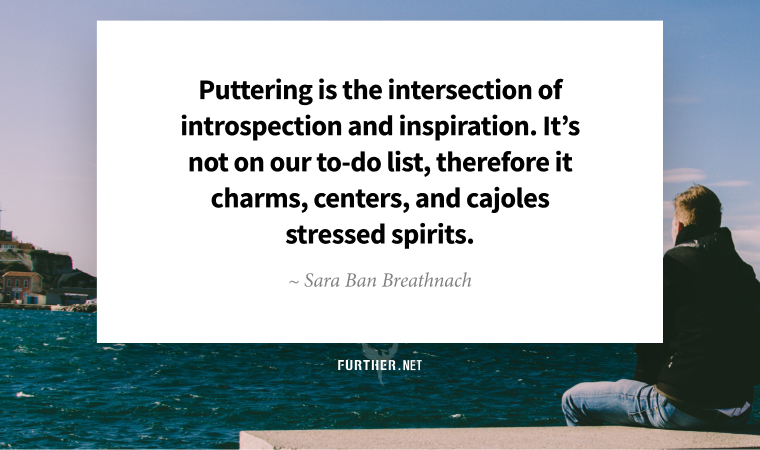
Want to know how you can tell when I’m stressed? Just open the kitchen junk drawer, hall closet, or pantry. If you find things organized, especially in distinct patterns, you’ll know it’s been a doozy of a week.
Puttering might not feel productive, and that’s because it’s not exactly. There’s an aimlessness and gratuitousness about it: finally alphabetizing your album collection by artist/genre isn’t the point. Think of it as an emotional and mental sorbet your brain instinctively serves up when it needs a break from its regularly scheduled stress-inducing activities.
So, puttering isn’t a waste of time. In fact, psychologists agree that small, repetitive tasks can be an effective way to preserve your peace — and productivity.
Take Stress to Task
Unlike full-blown procrastination, which may derail you from more purposeful work, a tidying up interlude can provide a therapeutic respite from the stresses of the day.
At the most superficial level, puttering may be useful because it occupies the mind, so that we devote fewer resources to the things that are worrying us.
There is scientific evidence that supports the efficacy of doing “mindless” tasks mindfully. For example, a study where people were asked to focus on sensations vs. the “how-to” of washing dishes found the sensory group had a significantly better mood afterward. Becoming immersed in the simple activity reduced nervousness and even made study participants feel “inspired.”
Beyond that, the act of cleaning and organizing provides a sense of “perceived control,” where your actions feel positive and proactive. This helps de-excite the central nervous system, reducing the fight-flight-freeze-please response and increasing feelings of well-being.
Master the Putter
The key differential between puttering and flat-out procrastination lies in the activities you choose. If it’s zoning out to endless hours of Schitt’s Creek on repeat (easy to do, I’ll admit, especially Season Two, episode two), then you’ve fallen woefully off-task. The point is relief can be found in a sense of agency and purpose.
Plus, taking on household projects like decluttering leaves you with a more Zen environment, reducing cortisol (the stress hormone) and increasing your ability to focus. When you do activities in puttering mode, the focus is on the act itself, not the result. Just let your brain meander its way to managing disorder and creating space for a refreshed outlook.
Importantly, you don’t necessarily have to remove the clutter to prevent this from occurring — simply rearranging it will do. Organising objects into groups — by colour, for example — may provide the brain with more obvious cues for navigating the chaos.
There are many ways to respond to uncertainty and stress in our tumultuous times. Puttering around might be one of the more straightforward ways to regain your footing — and your focus.
